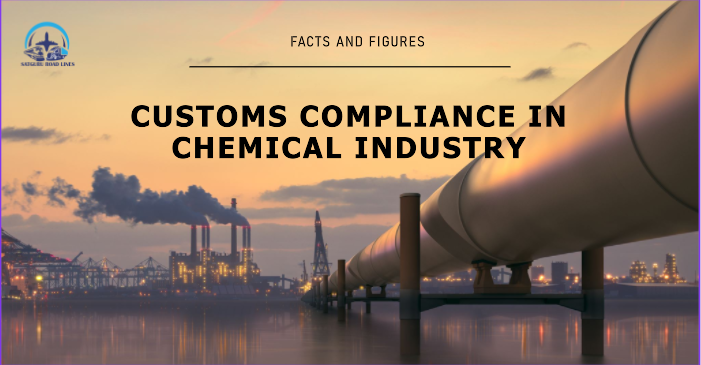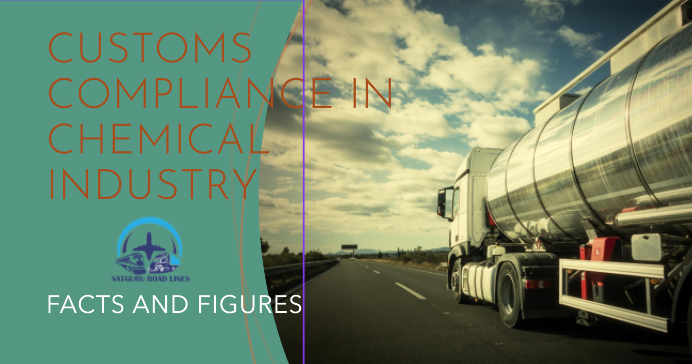
In the intricate web of the chemical supply chain, navigating customs compliance is a vital aspect that demands careful attention. At Satguru Road Lines, with our extensive presence in key hubs such as Delhi, Mumbai, Pune, Chennai, and Bangalore, we understand the significance of adhering to international trade regulations to ensure the seamless movement of chemical products across borders. In this blog post, we delve into the world of customs compliance, exploring its nuances, challenges, and best practices within the chemical industry.
1. The Regulatory Landscape
The chemical industry operates within a complex regulatory environment governed by international trade regulations and various regulatory bodies. The need for stringent adherence to regulations is particularly pronounced due to the high volume of chemical activities. At the forefront are entities such as the Environmental Protection Agency (EPA), Registration, Evaluation, Authorisation and Restriction of Chemicals (REACH), and the Occupational Safety and Health Administration (OSHA). These bodies play a pivotal role in establishing guidelines and standards to safeguard human health and the environment.
In recent times, the regulatory landscape has witnessed dynamic shifts with updates and amendments to existing regulations. Keeping abreast of these changes is crucial for chemical manufacturers and distributors to ensure compliance and avoid the repercussions of non-compliance.
2. Challenges in Customs Compliance
Customs compliance in the chemical supply chain is not without its challenges. The inherent complexities in navigating regulatory requirements often pose hurdles for businesses, especially in bustling cities. Failure to meet compliance standards can result in severe consequences, including fines, shipment delays, and damage to reputation. Through case studies, we aim to shed light on real-world instances where non-compliance had far-reaching implications for businesses in the chemical industry, particularly in these key urban centers.
3. Customs Compliance Best Practices
At Satguru Road Lines, with our operations spanning, we recognize the importance of implementing robust customs compliance practices. Documentation and record-keeping stand out as foundational elements, providing a transparent trail of compliance efforts. Investing in comprehensive training programs for personnel ensures that everyone involved in the supply chain is well-versed in compliance requirements.
Moreover, we advocate for a collaborative approach with regulatory agencies, fostering open communication channels, especially in cities with high chemical trade activities. Embracing technology is another cornerstone of effective compliance management. By leveraging advanced software solutions, businesses can streamline processes, reduce errors, and enhance overall efficiency in customs compliance, even in the fast-paced urban environments of these key cities.

4. Facts and Figures: The State of Customs Compliance in the Chemical Industry
To better comprehend the landscape of customs compliance in the chemical industry, let’s delve into some eye-opening facts and figures. Recent statistics reveal a notable increase in customs compliance violations, highlighting the growing challenges faced by businesses in adhering to stringent regulations, particularly in major chemical hubs.
Industry trends in regulatory enforcement suggest a heightened focus on ensuring compliance, with regulatory bodies globally intensifying their scrutiny. A comparative analysis of compliance practices across regions and cities showcases disparities in approaches and emphasizes the need for standardized practices on a global and local scale, especially in cities with significant chemical trade activities.
5. Case Studies: Success Stories in Customs Compliance
In the face of challenges, success stories emerge, demonstrating that achieving and maintaining customs compliance is indeed attainable. We shine a spotlight on companies within the chemical industry, that have exhibited exemplary compliance practices. By studying these cases, businesses in these urban centers can glean valuable insights and lessons to fortify their own compliance strategies.
6. Technology and Innovations in Customs Compliance
Technology plays a pivotal role in reshaping customs compliance practices. At Satguru Road Lines, with our widespread operations, we advocate for the integration of technology to simplify and enhance compliance processes. Emerging trends in compliance software and tools, including the integration of blockchain and artificial intelligence, offer promising solutions to address the evolving needs of the chemical supply chain in these dynamic urban environments.
7. Future Outlook for Customs Compliance in the Chemical Supply Chain
Looking ahead, the future of customs compliance in the chemical supply chain holds both challenges and opportunities. Anticipated changes in regulatory frameworks necessitate proactive measures by businesses to stay ahead of the curve. Industry initiatives aimed at enhancing compliance standards and the development of proactive strategies will be key in navigating the evolving landscape, particularly in these key chemical hubs.
8. Conclusion
In conclusion, customs compliance in the chemical supply chain is a dynamic and critical aspect that requires continuous attention and adaptation, especially in bustling cities like Delhi, Mumbai, Pune, Chennai, and Bangalore. At Satguru Road Lines, we advocate for a proactive and collaborative approach, embracing technology and best practices to ensure seamless and compliant movement of chemical products across borders. As we navigate the complexities of customs compliance, we encourage businesses in these urban centers to prioritize these efforts for the greater good of the industry and the global community.
